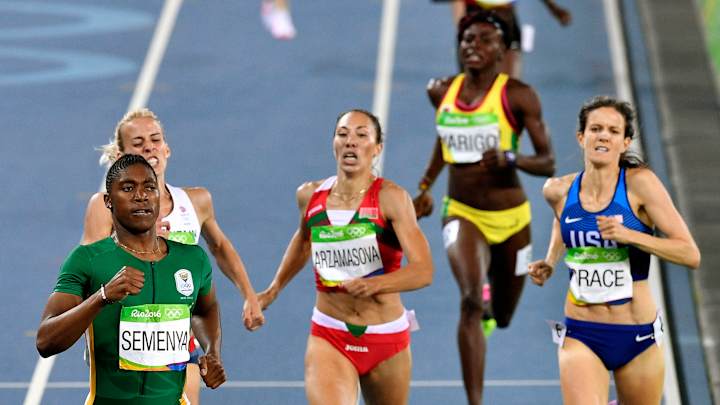Chased by controversy: A timeline of Caster Semenya's career

RIO DE JANEIRO (AP) Caster Semenya is the Olympic champion nearly seven years to the day after she arrived in track and field and sparked a controversy so complex and so sensitive, the sport is still struggling to deal with it.
Against her wishes, the 25-year-old South African has become the face of the debate over whether women with much higher levels of testosterone than normal should be allowed to compete, unchecked, in top-level athletics. Because of Semenya, the IAAF put rules in place in 2011 to regulate women's testosterone levels, believing that high levels of the hormone gave them an unfair advantage. But the rules were dropped last year after a legal challenge by Indian sprinter Dutee Chand and were not in place at the Olympics.
Semenya and Chand are not the only ones the rules were apparently lifted for. There are also believed to be other female athletes to compete at the Rio Games with a condition called hyperandrogenism, giving them abnormally high levels of naturally-occurring testosterone.
Here's Semenya's story up to now, and an explanation of hyperandrogenism rules:
---
August, 2009:
Semenya wins the 800-meter world title in Berlin as an 18-year-old newcomer, dominating a field packed full of the world's best runners to triumph by a huge margin - and stunning everyone watching. It was only half the story. Hours before the race, news leaked that the IAAF had conducted unspecified medical tests on the teenager. The tests - likely to verify Semenya's sex and also to measure her testosterone levels - led to her being declared ineligible to compete for 11 months. The IAAF has never commented publicly on the medical details of Semenya's case. It was also later revealed that South Africa's track federation asked Semenya to have medical examinations.
---
March, 2010:
Suspended - apparently because of her high testosterone levels - and frustrated with being forced to sit on the sidelines, Semenya turns up at a track meet in Stellenbosch, South Africa and demands to be allowed to run. Organizers, respecting the IAAF suspension, didn't let her. In a statement released through her lawyers, she then made clear her feelings:
''I have been subjected to unwarranted and invasive scrutiny of the most intimate and private details of my being,'' Semenya said. ''Some of the occurrences leading up to and immediately following the Berlin World Championships have infringed on not only my rights as an athlete but also my fundamental and human rights.''
It was one of few occasions where Semenya has spoken publicly about her situation.
---
July, 2010:
In a brief, three-sentence statement, the IAAF announces that Semenya is cleared to compete again against other women, nearly a year after her gold at the worlds. The IAAF gave no details, only saying: ''The process initiated in 2009 in the case of Caster Semenya (RSA) has now been completed.'' The ''process'' the IAAF referred to is believed to be a course of testosterone-suppressing medication to reduce Semenya's hormone levels to within the normal female range. She kept her world championships gold medal and title.
---
September, 2011:
Semenya, likely while taking the hormone medication, wins silver in the 800 meters at the world championships in Daegu, South Korea, behind Russia's Mariya Savinova.
---
August, 2012:
Semenya, a hero back home, carries South Africa's flag in the opening ceremony at the London Olympics. On the track, she again finishes with silver behind Savinova, the Russian athlete now accused of doping. But the controversy over Semenya is stirred again when a television commentator suggests she may have lost intentionally to avoid the scrutiny that would come with a gold medal. Semenya dismisses the suggestion as nonsense.
---
2013-15:
In terms of results on the track, it's the toughest period in Semenya's career. Struggling with injury, and going through multiple coaching changes, Semenya slips down the pecking order in the 800. It's also speculated that the hormone medication is having an effect on her performances. In 2014, Semenya's best time was 2 minutes, 2.66 seconds, a huge seven seconds slower than the personal-best of 1:55.45 she ran in that breakthrough race at the 2009 world champs. She didn't even qualify for the final of the 2015 world championships a year ago, finishing last in her semifinal.
---
July, 2015:
But a month before those 2015 worlds, a decision is made in sport's highest court that has a huge bearing on Semenya's story. The Indian runner Chand opens up about her hyperandrogenism - the only current athlete to do so - and challenges the IAAF on rules that limit women's naturally-occurring testosterone. She won a temporary order, and the IAAF was told to drop the rules regulating testosterone until they can show how much of an advantage it gives to athletes.
---
July, 2016:
Semenya, back to the dominating form of 2009 and easily the strongest 800 meter runner in the world again, runs a personal-best time of 1:55.33 at the Diamond League meet in Monaco. It's the fastest anywhere in the world for eight years. She goes even faster at the Rio Olympics.
---
Aug. 20, 2016:
Semenya wins her first Olympic title, with her victory coming two hours after IAAF President Sebastian Coe, who was at the Olympic Stadium, says the international athletics body will go back to the Court of Arbitration for Sport in an attempt to have the testosterone-limiting rules reinstated.
---
Follow Gerald Imray on Twitter: https://twitter.com/GeraldImrayAP
